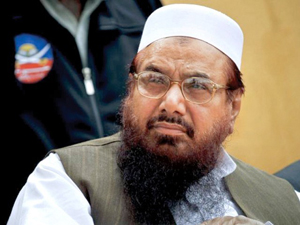New Delhi, Sep 9: Jama't ud Da'wah chief and one of India’s most wanted, Hafiz Muhammad Saeed has come out with fresh vitriol against India.
After visiting flood affected areas in Pakistan occupied Kashmir, Saeed said that the calamity is essentially India’s doing.
Saeed claimed that the flood was caused due to the sudden release of water in o the rivers by India.
He further added that if the Ladakh dam project is completed then even Islamabad would be threatened.
According to reports in Pakistan media, Saeed called ‘water terrorism’ by India a bigger threat than LoC violations and called on their government to raise the issue.
Posting his views on twitter, Saeed also slammed the Narendra Modi government for failing to help Kashmiris.
The Jama't ud Da'wah is running various relief and rescue operations for people in Pakistan. Their chief has offered to extend the relief efforts to India as well, asking the governments to set aside political differences and unite to help people.





Comments
Add new comment